‘Rebels with a cause’: In-Zine event celebrates the importance of self-published zines that challenge oppression
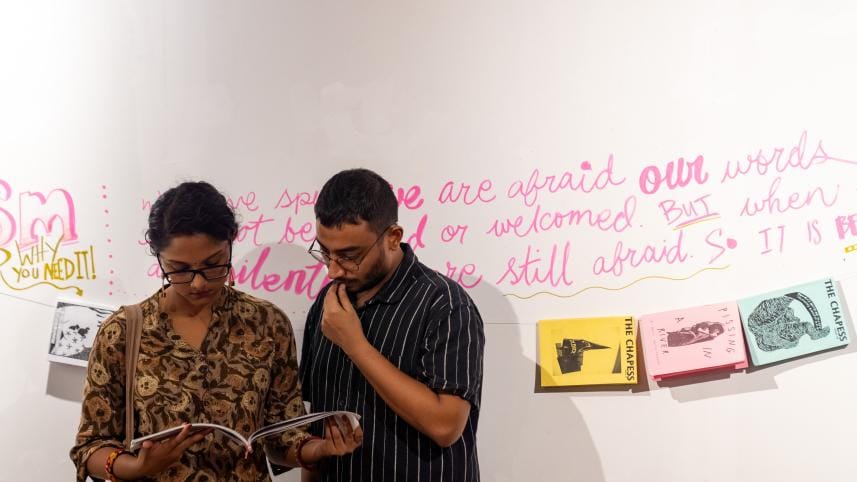
In the world of zines, women are undoubtedly a force to be reckoned with. Zines are digestible self publications often curated by women and marginalised groups struggling for recognition. Zine workshops centred around womens' work can provide a safe space for these silenced voices and challenge the status quo.
Sister Library and HerStory Foundation, in collaboration with Star Books and Literature, Goethe-Institut Bangladesh, and SHALA Neighbourhood Art Space, held a two-day event titled "In-Zine: Rebels with a cause" at Aloki convention centre. Last Friday, August 30th was an evening of music performances, poetry and zine making.
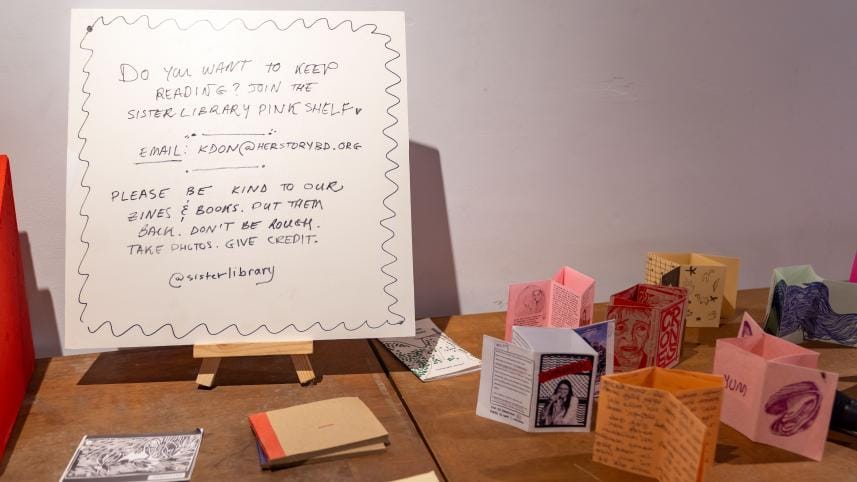
In her opening remarks, Nazia Manzoor, Editor, Star Books and Literature commented that "The July revolution showed us that we have been silenced for a long time. Zines are a method through which we can reclaim those lost voices." She continued, "I hope today's session allows us to make room for those silences and also reminds us that the work of the revolution is far from over."
The event kicked off with some fantastic music performances by Shaveena Anam as well as the all-female ethnic community band, F Minor. The artists, besides presenting their mellifluous vocals and melodies, also interacted with their audience—making it a beautifully immersive experience as everyone sang and hummed along with the music.

Amreeta Lethe opened the Reading out Loud session by reading out an excerpt from an essay titled, "It has to be print". She read: "Zines have long been a popular means of sharing experiences and making information accessible among various communities, by way of their self-published and non-commercial natures. Zines have also historically been adopted by marginalised communities as a means of disseminating ideas, advice, and knowledge in a way that is ungoverned by any major institution, and thus not subjected to their policies, practices, and prejudices of censorship."
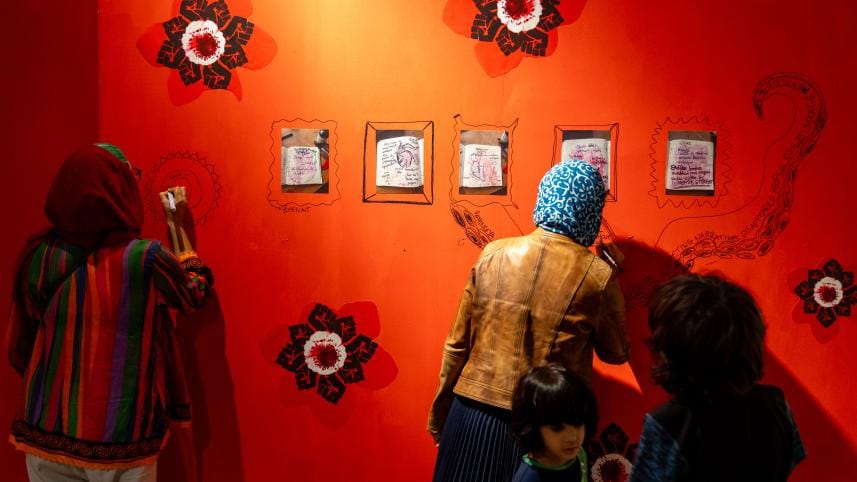
The piece provided necessary insight needed on the harsh realities of the publishing scene, as well as noted how zines are tackling these issues. She also spoke of her experience on how she felt watching television news channels give misleading and untruthful assurances during Bangladesh's recent internet blackout, and her words resonated with everyone in the room.
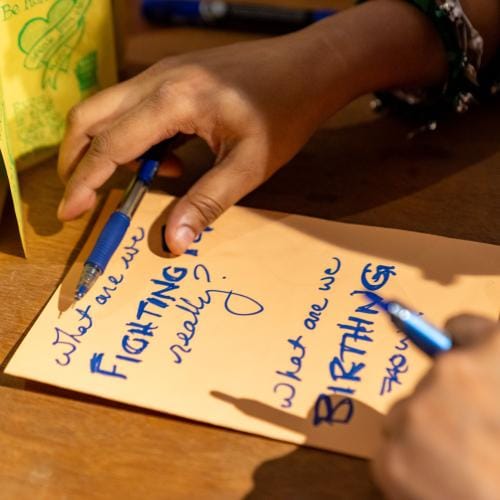
This was followed by a series of powerful poetry recitations. Many talented writers shared their work with the audience. After hearing from the poets Snata Basu, Maliha Tribhu, and Tahseen Nower Prachi, an open mic session commenced. Performers read out original pieces, some of which had been published on Star Literature during the recent ongoing student protests and after. The writer-poets offered their unique perspectives, mainly on the theme of the July Revolution. Their words exuded overwhelming feelings of grief, loss, pain, hysteria, shock and most prevalently, courage. The power of the written word was truly palpable in these moments.
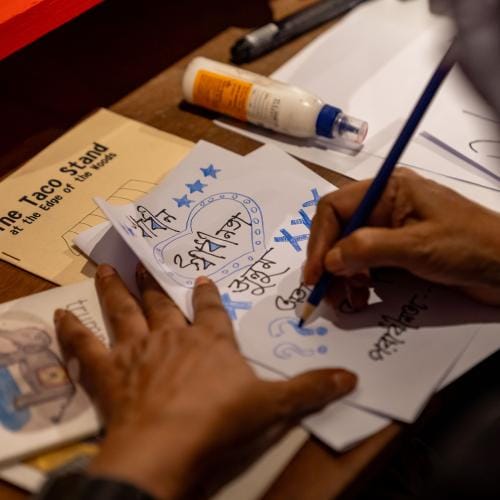
After a short snack break where the participants of the event mingled, the Zine Making workshop began. Participants gathered and clustered on the ground together and took turns to introduce themselves. Some highlights of this were the participation of a medical student from Gaza studying at DMC, a computer science professor at NSU, a pre-teenager experiencing art block, students of literature, and many more. Their diverse backgrounds and perspectives all converged into one activity—creating their own small, self-published zines that have historically been a means of expressing one's raw thoughts and emotions.
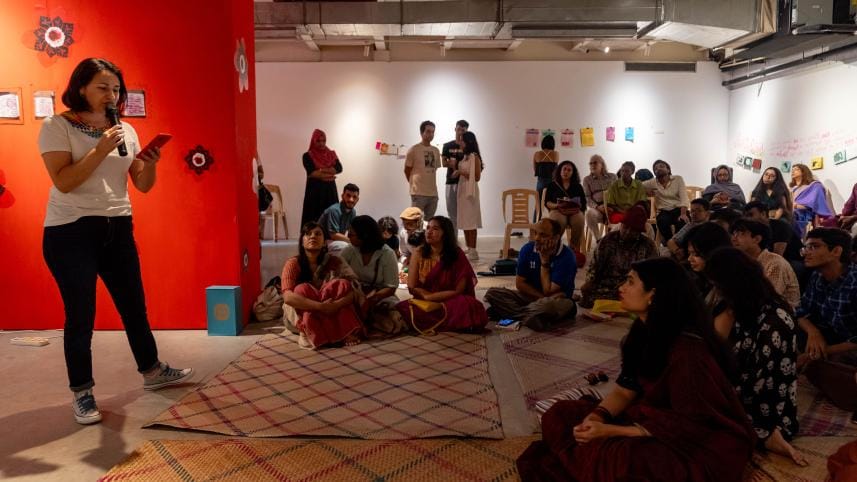
The session was Led by Katerina Don, Curator of HerStory and Sister Library who encouraged participants to freely cut, paste, draw, and write their way into new narratives. Without any inhibitions, all participants had the chance to express themselves freely and draw or write whatever they wished to convey onto the pieces of paper—transforming blank pages into their own personal zines. The experience was hands-on, intimate, and vulnerable, as many paid tribute to the lives lost in the July Revolution, as well as writing and creating art dedicated to their own personal struggles. These zines were displayed on the second day of the event, August 31st, at an exhibit that was also held at Aloki.

About the event and zine-making in general, Katerina Don remarked, "Sister Library sought to harness this sense of 'Yes, I Can' through reflection and community. And this is the spirit that makes a zine, a zine." She also mentioned, "We have known courage. This moment's sense of agency is not to be wasted. Through this event, we wanted to tap into people's memories and experiences of the uprising. A collective recollection caught on paper, collected in a shoebox, and soon to be shared through a composited zine."
The zines from the event will be distributed at Sister Library's next event in October.
Deeana Maqsood is currently an intern at Star Books and Literature. She enjoys naps, ice cream, and rewatching her favourite shows countless times in a row. Reach her at deeanamaqsood@gmail.com.



 For all latest news, follow The Daily Star's Google News channel.
For all latest news, follow The Daily Star's Google News channel.
Comments